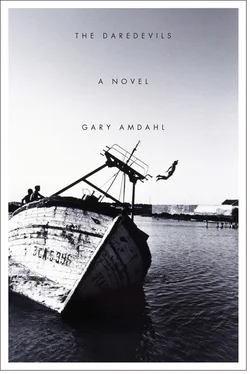Oh yes, he was a man, a holy Romantic man, and women still loved him, would still love him, after his voice changed, after he was no longer an angel. They would love him no matter what his voice sounded like. Love him because he was rough and immediate at the same time he was holy and remote. He was, on the stage of the theater of the universe, a great player, a great and holy player, capable of anything and everything. He would be loved immoderately and never forgotten. He would compose as Pergolesi had composed, if only for himself — the Voice was in the Mind — and live on brightly lit stages, exposing the real for what it was: a sham. And when he died, he would be remembered by everybody but mourned only by a handful, who knew who he really was, what he had really done, and the women who had shamefully, secretly loved him as a boy, who had petted and kissed him to the point where he’d had to take a firm step back and give them a look: a cock of the head, eyebrow charmingly raised, a half-smile. You have enlightened me. Now, darling, go away. Enlightenment, endarkenment — he had to fiddle constantly with his terms and in the end was not all that interested in consistency and cogency. If, in the back of his mind, there was tacit admission that once or twice perhaps it was at him the looks had been given, coming from the shadow faces above the long, slender, gloved arms that had removed the delicious cheeks and swelling bosoms. that hardly mattered, either. What mattered was the smell of the perfume. The taste of the skin. The faint rushing sound of the fabrics of their dresses. The looks in their eyes as they lied to themselves and saw him refusing to lie to himself, were frightened or in a sexually muddled awe of him — or, yes, appraised him from a new vantage point which they refused to let startle them: The little angel wants me! This is San Francisco — might I. get away with it? If they wanted it, they would have to come and get it, because he knew he did not know how to get it for himself. Or rather, he knew but felt a constraint he was not yet willing to loosen. But oh, he would give it to them and take it from them because he wanted it and wanted to give it away — but he knew. He was not a fool. The constraint was there for a good reason. He was a sound and balanced young man in a state of permanent temptation by Lust for the Unreal. Even if he went blind! Feeling alone would be enough, because the whole of his body could see: the palms of his hands following the curve of their shoulders, his fingers lightly tracing their lips — because, of course, out of tender pity, they would allow him to explore their bodies with his hands: it was the least they could do for the little angel singing in the heavenly darkness. Women would want to make love to his portrait centuries after he’d become rags and bones. He let himself think these thoughts. He could use them when he performed. He allowed himself to revel in it, but then, quickly, quickly, but not hastily, not insincerely or conveniently, the revelry would turn resolutely to revilement. He was not a rake. He would make no progress. After a while, he would step off the stage and never return. He would not, could not, hate his body. He would simply put it off. Yes, another controversial thought: sex was a childish thing. He would put it off, shake it off like a coat, fold it over the back of a chair, give it to the Salvation Army. San Franciscans who, let our wise little angel speak candidly for a moment, who more often than not were not the masters of the Deadly Sins they entertained, who were caught up in the whirlwind of politics and business of Regeneration, who said, who orated it, that they worked for the miserable poor, for the welfare of every citizen of — let us say it again, humbly, the greatest nation the world has ever known, but who, in the end, couldn’t quite be parted from one penny of their profits or one wan meaningless exercise of power? Oh, it was not only the bedrock of the American way of life — whether they conquered their sins or their sin conquered them, or if it was a draw, an inconclusive negotiation, it was as important to Charles, the young man who had waited out his time as an adorable angel and was now ready for Regeneration of his own making, as anything could possibly have been. Charles aimed to be a Christian artist. A humble artist, not a crazed zealot. His heart was wholly engaged, as was his mind. If he was not a zealot he nevertheless saw no room for the compromise of his belief. The fevers came and went. That was life. He lived. As an eleven-year-old boy he had read, on his surprised and pleased sister’s advice — she had been learning to calm her nerves not with the power and glory but with the solace and wonder, the serenity of Christ — Rauschenbusch’s Christianity and the Social Crisis and then, in the wake of the disaster, the horror, he had seen the actual nature of the Universe. If the connection was obscure to his friends and family, obscure to the point of irrelevancy, that only confirmed him. You helped the poor with food and shelter and clothing and a love that was just like the love you had for yourself, and when that was not enough — as surely it could never be — you demonstrated the unreality of everything around them, thereby helping them by preparing them to die — not just die, but die with joy and relief and expectation of eternal bliss. Everything could disappear in an instant and be replaced in an instant. Everything in fact was destroyed and remade every instant. There was nothing more dependably solidly real than the imagination, and the best place to demonstrate the incontrovertible reality of the imagination was on a stage.
If you could not afford a ticket, space would be made for you anyway. He did not want to work it out systematically, philosophically. He wanted to make it. He wanted to make it appear on a stage, like a magic trick that suddenly made everything around it the illusion. There was your salvation, wretched of the earth: the only life is in Jesus Christ, and you have to be destroyed to know it. Watch the brightly colored mannequins on the stage and you will see The Way.
“Christopher Newman is the name of the character you are playing in The American .” Sir Edwin spoke calmly but firmly to Charles, who had suddenly realized what an abyss lay between rehearsal and performance, and who was consequently experiencing the last condition he thought he would ever feel, that of “stage fright.” He had somehow convinced or duped himself, via his own obscure speeches to the company, into thinking something was at stake that had never been at stake before, and was going to pieces. “You are like him in many ways, perhaps too many ways: Newman could have been your grandfather—”
“The chronology isn’t quite right — more like a much older brother of Father’s, or a half-brother from an earlier marriage.”
“And while your diligence in constructing a biography of Newman that would have pleased Stanislavsky in the early years of the Moscow Art Theater is remarkable and laudable, it would not have much impressed the Stanislavsky of today, now that the idea that it can all be worked out in advance of the actor appearing on the stage and moving about has been repudiated as being of little avail when the actor does in fact appear on the stage and move about — repudiated as being an actual and frustratingly burdensome hindrance. The tone and volume of your voice, the manner of your accommodation of the other actors onstage with him, the nature and timing of your gestures and the effect the properties you handle has on you — this is as you have tirelessly and perhaps tiresomely noted is what matters, and is the means by which Christopher Newman might be located and animated. You are to spend no more time on thought, but quickly and quietly enter into what is to be done, whether you are James’s Newman, Shakespeare’s Romeo, or Strindberg’s Arkenholz. If you insist in your panic on illustrating your speeches to make sure everyone understands, you will, I assure you, vanish from the stage. It is a magic trick, from which anti-magic will spring. You are a big, tough Christian.” Sir Edwin was now, inexplicably, speaking with a Russian accent. Charles supposed it was because they had been talking about Stanislavsky. “You are at home in world.”
Читать дальше












